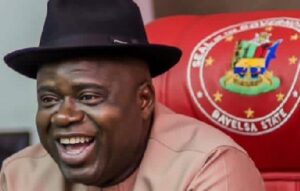Bayelsa State Governor, Diri Expresses Concern Over Prolonged Power Outage in Bayelsa, Highlights State’s Struggles
Bayelsa State Governor, Diri Expresses Concern Over Prolonged Power Outage in Bayelsa, Highlights State’s Struggles

Bayelsa State Governor, Douye Diri
Bayelsa State Governor, Douye Diri, has expressed frustration over the ongoing power outage in the state, which has lasted for over three months. The disruption, he noted, was caused by the vandalism of 13 power towers located in Bayelsa and neighboring Rivers State.
Speaking at the 20th All Nigeria Editors Conference in Yenagoa, the state capital, Diri revealed that while Bayelsa has been plunged into darkness for months, similar outages in other regions, particularly in the North, have been resolved. He assured the public that his administration, in collaboration with the Transmission Company of Nigeria, is working diligently to restore electricity to the state.
The governor also highlighted his administration’s exploration of alternative power solutions, including the possibility of establishing an independent power project. Diri reflected on the legacy of two outdated gas turbines, inherited from the former Rivers State, which once had the capacity to generate 20 megawatts of electricity but have since become obsolete.
In his speech, Diri discussed his administration’s ambitious ASSURED agenda, which focuses on seven key pillars: agricultural development, the blue economy, youth and sports development, security and peace, urban and rural renewal, robust healthcare, and economic growth. He emphasized the importance of innovation in education and quality delivery across all sectors.
On the role of the media, Diri praised the press as the “fourth pillar of democracy,” acknowledging the crucial role journalists play in shaping public discourse, fostering unity, and promoting democratic principles. He urged the media to continue upholding integrity, which he deemed essential for maintaining public trust and the foundations of democracy.
Addressing the theme of the conference, “Economic Growth and Development Strategies in Resource-Rich Countries,” Diri underscored the paradox of Nigeria’s resource wealth coupled with widespread poverty. He pointed out that despite Bayelsa’s contribution to the nation’s oil and gas output, the state faces severe environmental challenges and economic hardship, with its people often overlooked and their rights disregarded.
He shared two significant developments that reaffirmed his commitment to driving constructive dialogue on resource management in Nigeria. First, he highlighted a lecture he delivered at the University of Nigeria in Nsukka, where he tackled issues of structural inequality, fiscal autonomy, and the imbalance of power within Nigeria’s federal system. He also discussed the Bayelsa State Oil and Environmental Commission’s report, which documents the devastating impact of oil pollution on the state’s environment and public health.
Diri lamented that Bayelsa, despite bearing 25% of Nigeria’s oil pollution, receives inadequate compensation for the environmental and health crises that follow. The report called for urgent reparations and long-term solutions to address the damage caused by oil and gas activities in the region.
Referring to the 13% derivation funds allocated to oil-producing states, the governor emphasized the stark imbalance, noting that Bayelsa suffers from an 83% deprivation that perpetuates inequality and injustice.
He also spoke about his recent meeting with President Bola Tinubu, where they discussed these pressing issues. Diri expressed his gratitude for the president’s understanding and support, noting the importance of such discussions in fostering policies that prioritize sustainable development and empower local communities.
Reflecting on his leadership since his re-election, Diri reiterated his commitment to Bayelsa’s prosperity, pointing to significant infrastructure projects, such as the construction of senatorial roads, coastal access to the Atlantic Ocean, and the development of the Blue Economy. He also highlighted the Ernest Ikoli Media Complex, positioning it as a key part of his legacy and a hub for media development in the region.
On the challenges faced by a free press, Diri quoted Walter Lippmann, who argued that a free press is not a privilege but a necessity for a great society. He acknowledged the delicate balance the press must maintain between financial sustainability and editorial independence. Diri called on journalists to uphold truth and integrity, even in the face of financial pressures that could compromise their work.
In conclusion, the governor urged the media to play a pivotal role in advocating for reforms that ensure responsible resource management, address environmental and economic disparities, and improve the lives of ordinary Nigerians. He emphasized that the time for meaningful change is now and that the press must be at the forefront of driving this transformation.
TRENDING SONGS
 WOMAN REVEALS HOW PATIENCE AND TIMING HELPED HER BUILD A PEACEFUL FIVE-YEAR MARRIAGE
WOMAN REVEALS HOW PATIENCE AND TIMING HELPED HER BUILD A PEACEFUL FIVE-YEAR MARRIAGE
 How N100m Was Mistakenly Paid Into Egbetokun’s Son’s Personal Account — FPRO
How N100m Was Mistakenly Paid Into Egbetokun’s Son’s Personal Account — FPRO
 RCCG PASTOR ANGRY OVER CALLING Him“MR” INSTEAD OF “DR,” DECLARES CURSE ONLINE
RCCG PASTOR ANGRY OVER CALLING Him“MR” INSTEAD OF “DR,” DECLARES CURSE ONLINE
 NPMA Appeals to Nigerian Government for Compensation After Lagos Market Fire
NPMA Appeals to Nigerian Government for Compensation After Lagos Market Fire
 Rest Every Four Hours, FRSC Issues Safety Guide for Fasting Motorists
Rest Every Four Hours, FRSC Issues Safety Guide for Fasting Motorists
 NNPC Boss Ojulari Bags UK Energy Institute Fellowship
NNPC Boss Ojulari Bags UK Energy Institute Fellowship
 Shock in Anambra: Bride Disappears Moments Before Wedding
Shock in Anambra: Bride Disappears Moments Before Wedding
 Nigerian Woman Returns ₦330 Million Accidentally Credited to Her Account
Nigerian Woman Returns ₦330 Million Accidentally Credited to Her Account
 APC Don Reach Morocco?’ VeryDarkMan Reacts to Seyi Tinubu Poster
APC Don Reach Morocco?’ VeryDarkMan Reacts to Seyi Tinubu Poster
 Bride Breaks Down in Tears as Wedding Meals Were Kept Secretly While Guests Go Home Hungry
Bride Breaks Down in Tears as Wedding Meals Were Kept Secretly While Guests Go Home Hungry
Share this post with your friends on ![]()













